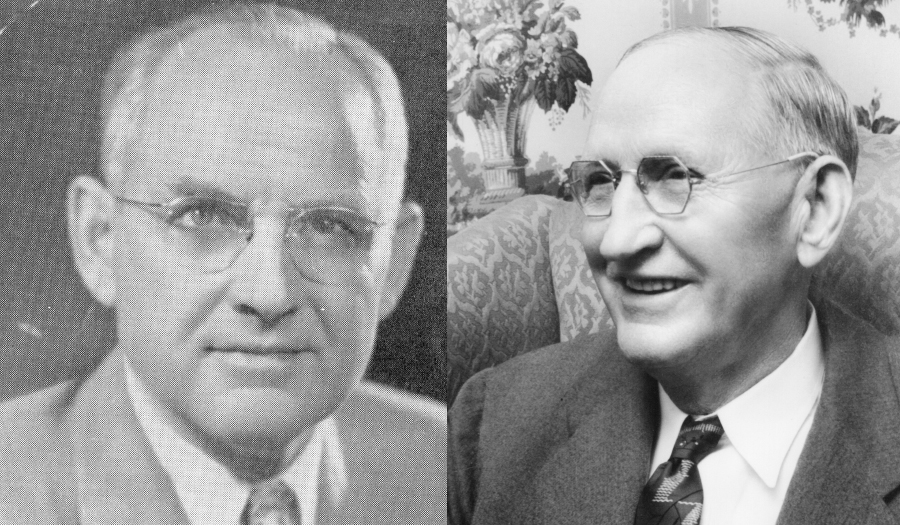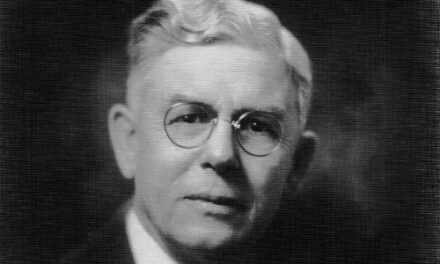
Tom Broyhill and his younger brother Ed had a close working relationship. Tom got into furniture manufacturing first then gave Ed, twelve years his junior, a start in the business. After a six-year apprenticeship, Ed left to start his own company. By all indications, Tom applauded the move.
Ed’s Lenoir Chair Company was created to make upholstery, which complemented Tom’s Lenoir Furniture Corporation’s production of case goods. Even though there were now two companies with a Broyhill at the head, they were once again working together.
Ed’s company sported a profit from the very beginning. In its first year (1926), Lenoir Chair brought in between $150,000 and $200,000 in business. With each successive year, things continued to improve, even during the Great Depression. Part of the secret was Ed Broyhill’s work ethic. He was known to spend long weeks on the road, listening closely to his customer’s needs. After hearing what kind of chair or sofa they wanted, he would sketch out the new look, return to Lenoir and make it. From time to time when he needed extra money, he sold insurance on the side, which highlighted other important skills, a strong desire to succeed and salesmanship.

om and Ed Broyhill as each reached retirement. The company they created would live on without them, although in a much different form.
Even though they were two separate companies, the Broyhill boys worked together. Each invested in the other’s company. Since Tom was older, he generally held a more risk-averse view of business opportunities. Ed was more aggressive. Several times during the Depression, factories in the area shut down. In Marion, Newton, Rutherfordton, and Conover, Ed sought to expand, convincing his older brother to help him buy those buildings and restart operations. In each case, the move proved profitable. When the purchases were reported, the press had already lumped Tom and Ed together, calling them the “Broyhill interests.”
It wasn’t until 1941 that the two came together officially, renaming Lenoir Furniture and Lenoir Chair, the Broyhill Furniture Factories, later Broyhill Furniture Corporation. By that point Tom was slowing down but Ed continued to accelerate. Like a relay race with the older brother handing the baton to the younger to keep momentum going, the company continued to grow. During Ed’s tenure, Broyhill enjoyed enormous name recognition. Regularly, folks in Lenoir (and across the nation too) saw Broyhill furniture featured as a prize on television game shows. With the future in mind, Ed trained his oldest son Paul to take the reins of the company as its president, while second son Jim became a long-standing member of the U.S House of Representatives.
Then came 1980. The company sold to a conglomerate (which came from a shoe-making company) and the long slow decline began. By the end of the century, the parent company, Furniture Brands International (FBI), was bankrupt. It wouldn’t be the last time that happened. One furniture worker described the Broyhill label as “just a name to be licensed, not a manufacturer or employer.” Her comment came as she ended a 37-year career with the company. Wistfully, she said it was once a great place to work.
Today, the Broyhill name is better known locally for the funding provided by the family’s foundation, created after the sale of the company. Two parks in Lenoir, named for each brother are among the amenities that also include a regional civic center, and the family home, both controlled by Caldwell Community College and Technical Institute. Furniture is still make under the Broyhill name, Big Lots acquired the brand in 2019, but none of it is made in the factories that once dotted the map of western North Carolina. What began with two brothers and grew to become on of the nation’s largest manufacturer of medium-priced furniture, exists in a world unrecognizable by Tom when he first put his name on a line back in 1905. But that’s business.









